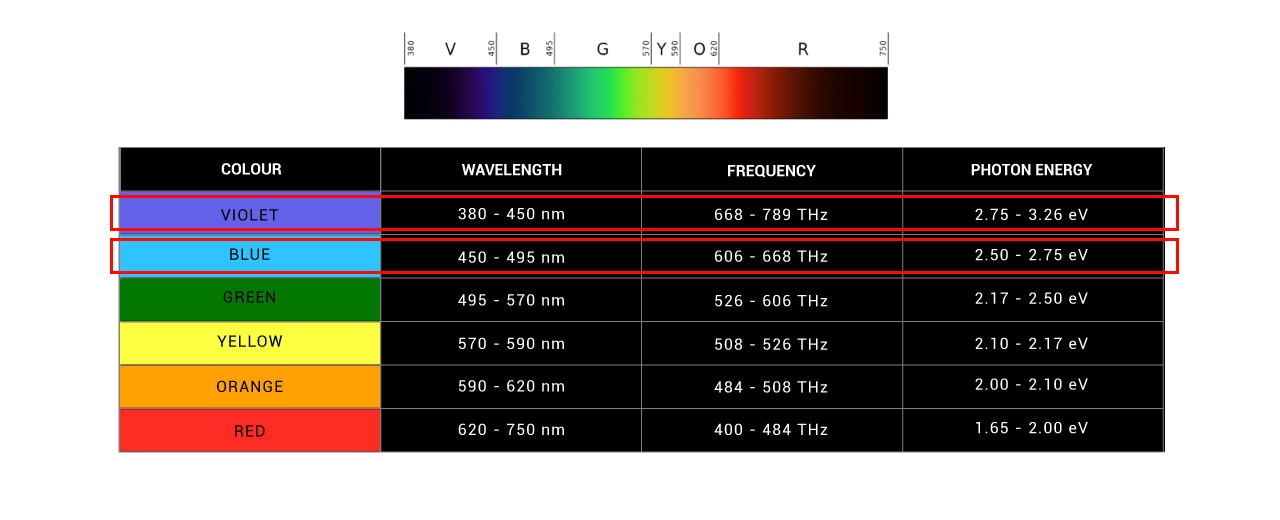Blue Light - The 'Good' and the 'Bad'
Article by: Adam Tan | Optometrist |
Blue light can be both beneficial and harmful to our eyes. When exposed to it in the day, it helps to heighten our alertness, and improve our memory. When exposed at night, it disrupts our sleep pattern.

Blue light is made up of two parts - the 'Good' blue-turquoise, which wavelength ranges from 450 - 500 nm, and the 'Bad' blue-violet, which ranges from 380 - 440 nm.

Blue-turquoise light can be beneficial to our health. It regulates the circadian rhythm (our internal 'body clock'), which controls our sleep-wake cycle, hence, it is essential for a restful night's sleep. The blue-turquoise light can also boost brain activity, improving memory, mood, alertness and mental performance.
As with UV rays, overexposure to Blue-Violet light can be harmful to the eyes. It can damage the retina, and potentially increases the risk of eye diseases such as age-related macular degeneration (AMD), cataracts and photokeratitis (sunburned cornea), which can lead to temporary blindness.
Studies have shown that exposure to bright blue-rich light during the day improves energy and alertness, boosts mood and also improve office workers' productivity and students' performance. Conversely, at night, the absence of blue-rich light can stimulate the production of Melatonin, which is a kind of hormones which helps to regulate our sleep-wake cycle. The production and release of melatonin help to slow down our metabolism. This helps us to relax and have a good night sleep. In addition, the absence of blue light at night also trigger the body's restorative processes such as cellular repair which is essential to sustain health and wellness.
Benefits of blue-light filter spectacle lens
- Reduces Digital Eye Strain
As short wavelength, high energy blue light tends to scatter more easily than other visible light, it is not easily focused by the eye. This can cause a reduction in contrast when looking at digital devices that emit
Research has shown that lenses that block blue light with wavelengths less than 450 nm (blue-violet light) increase contrast significantly. Therefore, computer glasses with blue-light filter lenses may increase comfort when you are viewing digital devices for an extended period of time.
- Reduces risk of retinal damages, age-related macular degeneration (AMD) and cataracts
Display screens of digital electronic devices emit harmful blue light that may lead to eye problems over time. Harmful blue light can lead to retinal damage, age-related macular degeneration (AMD) and even cataracts later in life.
The amount of time people spend using these devices and the proximity of these screens to the user's face has many eye care professionals concerned with the possible long-term effects of blue light on the eye.
In a nutshell, exposure to blue light can be both beneficial when exposed to it in the day for alertness and improved memory, yet detrimental when we are exposed to it at night as it disrupts our sleep pattern. Rather than watching television or checking your email in bed at night, try a warm bath or read a book to relax before your slumber. If you need to look at your phone or tablet before your sleep, talk to an eye care practitioner for spectacle lenses that filter out the harmful blue-violet light while letting the good blue-turquoise light through to your eyes.
References:
Blue light and your vision | Essilor Singapore. (n.d.). Retrieved from https://www.essilor.com.sg/learn-about-vision/eye-care/uv-and-blue-lights/blue-light-and-your-vision#tWeQE2Ff0iK1RUvy.99
Blue Light: the Good and the Bad | Singapore. (n.d.). Retrieved from https://www.zeiss.com.sg/vision-care/en_sg/better-vision/understanding-vision/eye-and-vision/blue-light-the-good-and-the-bad.html
7 Blue Light Facts: How Blue Light Is Both Bad and Good For You. (n.d.). Retrieved from http://www.allaboutvision.com/cvs/blue-light.htm
Visible spectrum. (2018, September 19). Retrieved from https://en.wikipedia.org/wiki/Visible_spectrum
Is blue light good or bad? (2018, February 23). Retrieved from https://www.sunlightinside.com/light-and-health/blue-light-good-bad/
Blue Light Is Everywhere- Is It Good Or Bad? (n.d.). Retrieved from https://www.essilorusa.com/newsroom/blue-light-is-everywhere-is-it-good-or-bad
